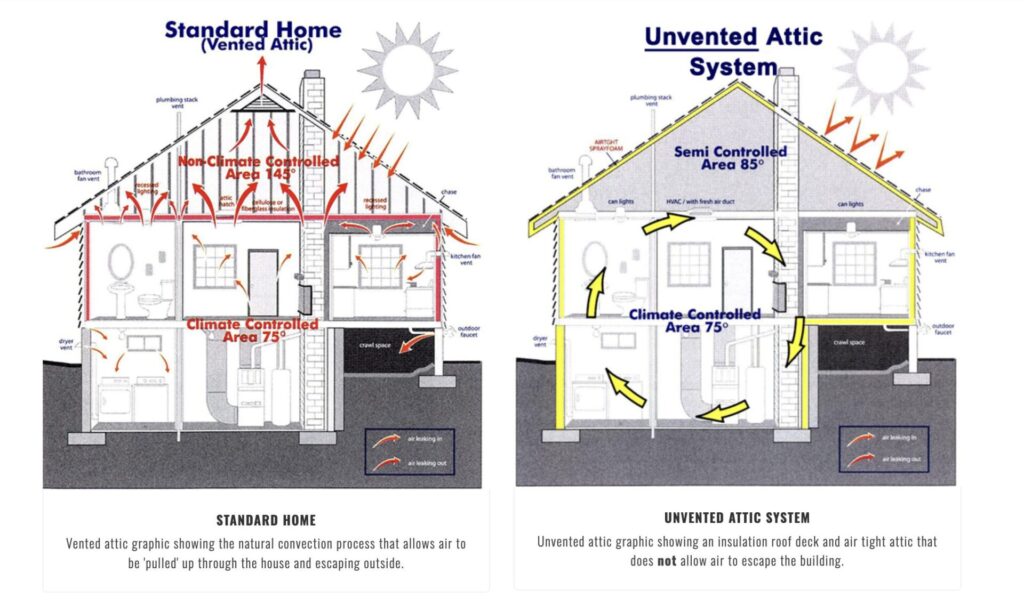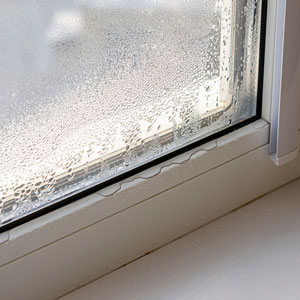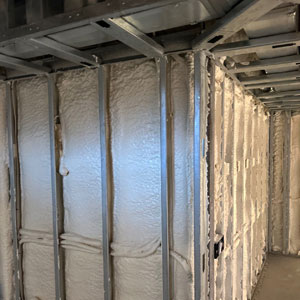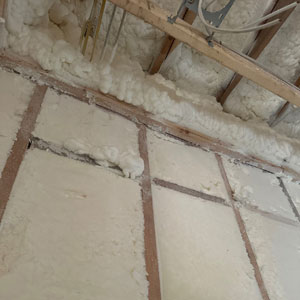Benefits
Air leaks in your home can lead to higher energy bills, moisture issues, and poor indoor air quality. That’s where spray foam insulation comes in. It seals unseen gaps, helping you save energy, stay comfortable, and create a healthier living environment.
Explore the benefits below or contact us for a free estimate!

Air Infiltration Reduction

Most air leaks in a home come not from doors and windows, but from hidden gaps in attics, crawl spaces, walls, and around fixtures and plumbing. These leaks can cause up to 40% of energy loss and lead to moisture issues, mold, and poor indoor air quality. Spray foam insulation seals these gaps, reducing air infiltration by over 90% while providing a thermal and moisture barrier. The result is a more energy-efficient, comfortable, and healthier home – with potential energy savings of up to 50%.
Energy Savings

Upgrading your insulation is a fast, cost-effective way to improve comfort and cut energy bills. Many homes – even newer ones – are under-insulated. Spray foam insulation seals air leaks, controls moisture, and can reduce energy costs by up to 50%. It’s a smart investment that pays off with lower bills, better air quality, and year-round comfort.
Fire Safety

When people think of insulation, energy efficiency comes to mind, but fire safety is just as important. Different insulation types perform very differently in a fire:
- Fiberglass is non-combustible, but its vapor retarders can be flammable and must be covered with drywall or another approved material.
- Cellulose is made from paper and treated with fire retardants, but studies show its fire resistance may decrease over time.
- Spray foam does not sustain a flame once the ignition source is removed, but like other materials, it must be covered with a thermal barrier per code.
Spray foam is also safe for indoor air quality and the environment, with no harmful emissions. It’s even been used in American Lung Association Health House projects for healthy home building.
Moisture Control

A healthy home keeps humidity between 40–60%. Spray foam insulation helps maintain this by sealing out moist air, reducing condensation, and preventing mold growth. It also improves energy efficiency, lowers humidity, and creates a quieter, more comfortable living environment.
R-Value

Not all insulation with the same R-value performs equally – air leaks cause up to 40% of energy loss. Spray foam offers lasting R-value and superior air sealing, preventing leaks that reduce efficiency. It maintains performance over time and supports energy codes focused on whole-house efficiency.
Contact us for a free estimate to see how spray foam can boost your home’s energy savings.
Sound Reduction

Spray foam insulation is ideal for soundproofing spaces like home theaters, bathrooms, bedrooms, laundry rooms, and plumbing walls to reduce noise from water flow. It seals air gaps where sound travels most easily and controls mid-range frequencies like voices and music.
Expanding up to 100 times its volume, spray foam fills cracks and holes to create a strong sound barrier, blocking noise from both inside (kids, home theaters) and outside (traffic, airplanes). It also reduces pipe vibrations from showers and toilets, making your home a quieter, more peaceful place.
Rebate Programs

Currently, homeowners can receive a $500 Federal Tax Credit for adding new energy efficiency upgrades to existing homes.
Builders of new construction homes may qualify for a $2,000 tax credit by meeting or exceeding Energy Star standards.
For more details, visit Energystar.gov.
Check out these energy rebate programs:
- DTE Energy
- Consumers Energy
Vapor Retarders

Seal Tech advises that when using our Spray Foam Insulation System, no extra air or moisture barriers beyond building wrap are needed. Spray foam’s low permeability seals cavities fully, blocking moisture-laden air – the main cause of vapor movement – and providing year-round vapor protection regardless of seasonal temperature changes.
Unlike traditional vapor barriers that can trap moisture and cause damage, spray foam controls air and moisture effectively, supported by research showing painted drywall suffices as a vapor retarder.
This simplifies construction, prevents air and moisture infiltration, and typically reduces heating and cooling costs by 30–50%.
